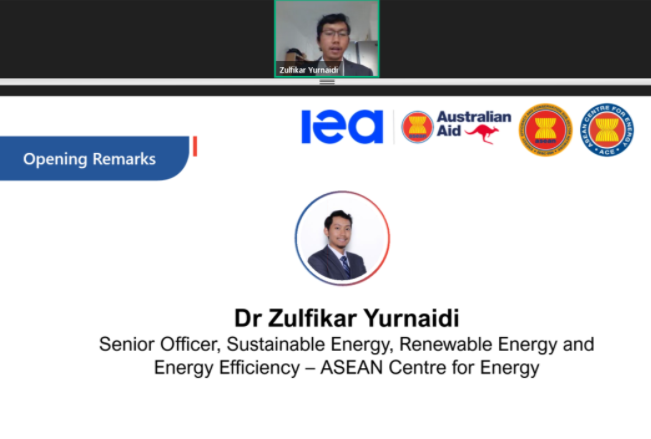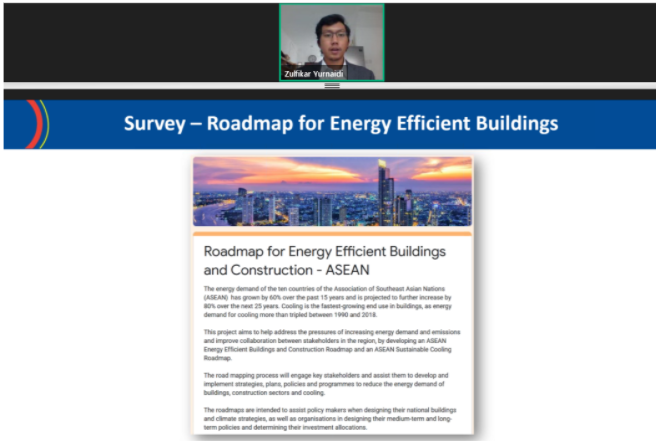Jakarta, 30 April 2021
As an effort in realizing APAEC Phase II, the International Energy Agency (IEA), in collaboration with ASEAN Member States (AMS) through the ASEAN Energy Efficiency and Conservation Sub-sector Network (EE&C-SSN), the ASEAN Secretariat and the ASEAN Centre for Energy (ACE) is conducting a project called Roadmaps Towards Sustainable and Energy Efficient Buildings and Cooling in ASEAN. Funded by the ASEAN-Australia Development Cooperation Programme Phase II (AADCP II), part of the project is a webinar on compliance for cooling products, held on 30 April 2021. The webinar was led by senior research analyst of ASEAN Climate Change and Energy Project (ACCEPT), Dr. Zulfikar Yurnaidi.

ASEAN-IEA Webinar: Improving Compliance for Cooling Products in Southeast Asia
The session was moderated by Ms. Melanie Slade, Senior Programme Manager of IEA. Energy efficiency (EE) is pivotal for achieving global climate goals. EE is expected to contribute over 40% of energy sector Green House Gas (GHG) reduction up to 2040. A deceleration in EE would minimize the chance of meeting long-term climate goals. Unfortunately, EE progress has already weakened due to Covid-19 pandemic. The Covid-19 crisis has greatly impacted both economic activity and energy demand, for instance primary energy intensity halved in 2020. However, EE plays a significant role of job creation for sustainable recovery. In fact, EE related investments are the largest category of spending and create more jobs per unit of investment. The IEA Sustainable Recovery Plan predicts average annual investments of USD 1 trillion for the next three years.
Meanwhile, Air Conditioner (AC) ownership has increased globally. In countries where it is hot all the time, only about 8% of households had ACs in 2016. However, by 2050 it is predicted that around 2/3 of the world’s households could have an AC. China, India and Indonesia will account for half of all AC units in buildings in 2050. As one of EE efforts, IEA became the coordinator of Super-efficient Equipment and Appliance Deployment (SEAD) Initiative in 2019. SEAD supports appliance energy efficiency policies and programmes for the 18 member countries and focused on four key product categories: electric motors, ACs, refrigerators, and lighting.
Collaborative Labeling and Appliance Standards Program (CLASP) Manager, Ms. Deha Dhingra, as the first speaker, explained the cooling compliance project in Southeast Asia. AC non-compliance will impact potential energy and emissions savings from EE policies. Even with only minimal non-compliance, global electricity consumption can increase from 1 TWh in 2018 to 11 TWh in 2026, resulting in USD 11 billion excess electricity costs. With higher rates of non-compliance, additional energy use and global costs can reach 125 TWh and USD 120 billion, respectively, in 2026. CLASP have worked on cooling compliance in ASEAN for national and regional support for ACs. CLASP’s regional support includes development of voluntary market surveillance as a guidance for AMS and Round Robin Testing exercise in Vietnam to build regional testing capacity for ACs. The market surveillance guidance outlines best practices for monitoring and identifying non-compliant ACs.
Malaysia’s cooling initiatives was brought by the second speaker, Ms. Hafiza Yob, Senior Assistant Director, Energy Commission of Malaysia. Most of Malaysia’s annual energy consumptions in 2019 comes from AC, followed by lamp. But the biggest savings come from lamp instead of AC. Therefore, EE efforts in AC are still crucially needed. Malaysia’s EE policy and regulatory instrument include National Energy Efficiency Action Plan, Efficient Management of Electrical Energy Regulations 2008, Electricity Regulations 1994 (Amendment 2013), MS 1525, and Building Energy Labelling Programme. MS 1525 is code of practice on EE and Renewable Energy (RE) for non-residential buildings that have become one of the compliance elements to the building constructions, aiming to create awareness to the building developer to build EE building. The Building Energy Intensity (BEI) Labelling aims to encourage government staff to improve the energy intensity on their buildings. Estimated saving from BEI labelling in electricity consumption is 520.8 GWh. Malaysia’s National Energy Efficiency Action Plan (NEEAP) 2016-2025 aims to save 52,233 GWh (8.0%) and reduce 37,702 ktCO2–eq emissions.
One of APAEC Phase II goal is to expand and implement the mutual recognition of EE arrangement, explained by the third speaker, Mr. Rizky Aditya Putra from APAEC Department of ACE. The ASEAN Electrical and Electronic Equipment Mutual Recognition Arrangements (ASEAN EEE MRA) function as guiding principle of reciprocity for participating AMS to accept test reports and/or certifications from listed Conformity Assessment Bodies (CABs), for eliminating technical barriers to trade. The main key action steps to integrate EE into EEE MRA Framework are legal provision, EE designated bodies appointment, information booklet, and harmonised process and document. In achieving ASEAN Economic Community (AEC) goals through Technical Standards Harmonisation & Mutual Recognition Arrangement for EE, it is important to balance energy security (EE infrastructures development and standards & labelling), affordability (EE technical standard harmonisation and elimination of trade barriers), and accessibility (EE MRA & monitoring, verification and enforcement (MVE) and product registration) to achieve sustainability.
The fourth speaker, Ms. Madeleine Edl, Energy Efficiency Specialist of UNEP-U4E pointed out about the Product Registration System (PRS). PRS has a significant role in EE as it works to create database with product information, monitor which products are sold in the market, place information on environmental impact of the products at the fingertips of government, foster economic development, and most importantly encourage consumers to choose energy-efficient products. Together with ACE, UNEP-U4E is working on development of regional product registration database that connects all countries in the region, information and guidance of policy makers, and training stakeholders. The regional system collects the information from the national system in a common database. The benefits of the regional database are visibility of products allowed for sale in other countries, notification of new products or products revoked in other countries, facilitates application of MRA, and conclusively helps the region to adjust their policies better and to create synergies in transforming their markets to energy-efficient products.

ASEAN-IEA Webinar: Improving Compliance for Cooling Products in Southeast Asia
At the end of the panel discussion, Dr. Zulfikar reviewed the importance of the information sharing platforms and mechanism which has been showed by the studies of voluntary market surveillance, product registration systems, strengthen by the case from Malaysia. The region is expected to have cooling energy efficiency system including the standard labelling, compliance system, and mutual agreement in the regional level. The implementation in regional level will also strengthen the overall systems. For instance, systems in one country can act as a learning material for other countries, resulting in more energy efficient system in the region. Dr. Zulfikar closed the sharing session by inviting all of the audience to contribute to Roadmap for Energy Efficient Buildings and Construction survey. Information gathered from the sharing session will be used to develop the roadmap, especially for cooling. By improving coherence between the ASEAN energy and climate policies, ACCEPT could boost the enhancement of compliance for cooling products in ASEAN.
SNF